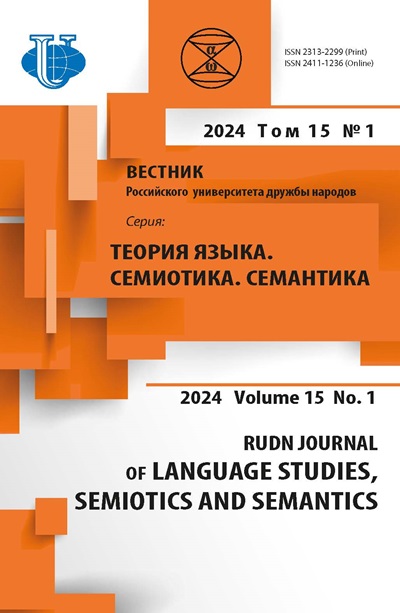Issue
Title
Authors
|
Krasina E.A., Jabballa M.X. |
|
Videgain C. |
|
Li X. |
|
Perfilieva N.V., Da Silva F. |
|
Ivanova I.G., Egoshina R.A. |
|
Valentinova O.I. |
|
Maksimenko O.I., Shuripa S.V. |
|
Lazareva O.V. |
|
Matytsina I.V. |
|
Baturina E.N. |
|
Feliksov S.V. |
|
Balyasnikova O.V., Cherkasova G.A., Stepanova A.A., Ufimtseva N.V. |
|
Nikiforova S.A., Chesnokova O.S. |
|
Mateykovitch E.V. |
|
Fomenko T.A. |
|
Kakzanova E.M. |
|
Muminova A.A. |
|
Nikolich M., Novospasskaya N.V. |
|
Safaralieva L.A. |
|
Denisova G.L. |
|
Chilingaryan K.P. |
|
Alontseva N.V., Ermoshin Y.A. |
|
Pasechnik T.B., Savelieva I.G. |
|
Lomakina O.V., Mokienko V.M. |
|
Tutova E.V. |
|
Pudikova G.N. |
|
Tkach D.G. |
|
Isabekova U.K. |
|
Lipatova T.V. |
|
Buribaeva M.A. |
|
Mamontov A.S., Moroslin P.V., Astremskaya H.V. |
|
Shalamov V.D., Gladkaya T.G. |
|
Lomakina O.V. |
|
Faje Fatu Diop -. |
|
Shumbassova S.S. |
|
Sharapova E.V. |
|
Ganapolskaya E.V. |
|
Denisenko V.N., Kalinina N.S. |
|
Osokina E.A. |
|
Filyasova Y.A. |
|
Frolova N.M. |
|
Mamedova K. |
|
Shaymerdinova N.G., Zhiyembay B.S. |
|
Chigasheva M.A. |
|
Nedosugova A.B. |
|
Faal-Hamedanchi M. |
|
Ngamsaengpruyek Usane -. |
|
Zavrumov Z.A. |
|
Novospasskaya N.V. |
|
Buribaeva M.A. |
|
Geichenko S.A. |
|
Shaklein V.M., Scomarovscaia A.A. |
|
Varzin A.V. |
|
Dugalich N.M. |
|
Vekshin G.V., Lemesheva M.M. |
|
Chigasheva M.A. |
|
Persiyanova S.G., Rostova E.G. |
|
Fityan Reema -., Azcutia Maite -. |
|
Bezkorovaynaya G.T. |
|
Volkova N.A. |
|
Gamov A.N. |
|
Khukhuni G.T., Osipova A.A. |
|
Shervashidze V.V. |
|
Nаydenova N.S. |
|
Dzhusupov N.M. |
|
Shevchenko O.A. |
|
Omelchenko V.V. |
|
Besolova E.B., Zakaeva B.K., Dzhioeva V.P., Denisenko A.V., Kalinina J.M. |
|
Grigoryan A.A., Strelchuk E.N. |
|
Korolkova A.V. |
|
Tejerina G. |
|
Vavilova Z.E., Broadbent J.T. |
|
Chichina M.O. |
|
Mukhortov D.S. |
|
Mikhaylenko A.Y. |
|
Emirova A.M. |
|
Chernishova E.B. |
|
Chernova L.A., Dubova M.A. |
|
Polyakova G.M. |
|
Gribanov I.S. |
|
Denisenko V.N. |
|
Shalamov V.D. |
|
Degtyareva N.P. |
|
Artyukhova N.S., Saykina O.S., Solovyeva A.A. |
|
Valentinova O.I., Denisenko V.N., Rybakov M.A. |
|
Kolysheva O.N. |
|
Gornostaeva A.A. |
|
Mukhortov D.S., Zhovner E.A. |
|
Kirov E.F. |
|
Nikitin O.V. |
|
Dildabekova A.K. |
|
Pascaud A. |
|
Fedulova M.N. |
|
Vasilyeva A.A. |
|
Chigasheva M.A. |
|
Nagzibekova M.B., Mirzoyeva Z.D. |
|
Manoucharyan I.K. |
|
Khalizadeh Aminiyan Zakhra -. |
|
Yaroslavskaya I.I., Astremskaya E.V. |
|
Vavichkina T.A. |









